Peter MALONE
Saturday, 18 September 2021 19:58
Showgirls
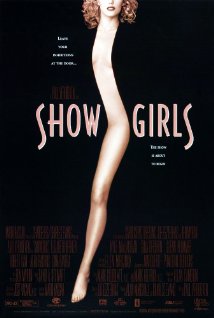
SHOWGIRLS
US, 1995, 128 minutes, Colour.
Elizabeth Berkely, Kyle Mac Lachlan, Gina Gershon, Glenn Plummer, Robert Davi, Gina Rivera, Lin Tucci.
Directed by Paul Verhoeven.
It's what you would expect, - plus. A familiar plot of a would-be dancer with a mysterious plot who wants to make it as an exotic dancer in Las Vegas - and who achieves her ambition. Buffs will recognise the echoes of All About Eve as Elizabeth Berkley (longer legs than acting talent) as Nomi Malone (!) becomes ruthless on her way to the glitzy top. Dutch Paul Verhoeven (Basic Instinct) directs with flair and bluntness rather than subtlety, but, all in all, it is pretty tawdry.
1. The film’s reputation? As a bad film?
2. The director, his work, blunt, interest in sex and sexuality, his visual style, unsubtle? Defenders of the film saying that he intended it to be kitschy, over the top?
3. Nevada, the countryside, Las Vegas, the city, casinos, small clubs, apartments, the shows, the business behind the shows? Auditions, careers?
4. Visual spectacle, the shows, costumes and decor, choreography? Songs and score? Provocative, nudity, sexy?
5. Nomi, her plans for a career, her naivete, hopes, the breaks? The theme from All About Eve?
6. Nomi, no background story until later, as regards her parents, leaving home, her career, solicitation? Her survival? Wanting to dance? Hitchhiking, the lift – and her tough attitude and drawing the knife? The final trip with the same driver – and saying that she had found herself?
7. Her arrival, tough, fights, finding Molly, sharing the apartment with her? Going to the clubs, Molly as a designer, a sympathetic character? Nomi assisting, eager?
8. Crystal, the star of the show, calling people Darlin’, attitudes, the shows, the star, sexy, nudity? Acclaim? Zac and the relationship? The sexual attraction to Nomi? Arranging the audition, coming on to her, Nomi’s resistance, the development of the relationship, tripping Crystal?
9. The world of the producers, cash, promotion, looking for talent, the staff at the casinos, the dancers and their world, the lifestyle?
10. Nomi, the audition, her chance? At the club, with Al, her friendship with Mama, Mama’s performances and the audience, appreciative? lapdancing, issues of touching, sex and exploitation? Nomi’s reaction? Leaving?
11. Her encounters with James, as a character, dancer, resisting him, the friendship and his support, training her, his relationship with the other dancer, his shown not being a success?
12. Zach, in the casino business, opportunities with him, sex, possibilities for love, the final clash?
13. The build-up to the accident, Nomi in the show, the witness, the dancers, the mother and the child and her rival, preserving her career?
14. The producers deciding that Nomi should be a star, training, glamour, her appearance in the show, posters, success?
15. Nomi and Molly, the party, the celebrity, the group rape, the effect on Molly, in hospital?
16. Crystal, in hospital, Nomi visiting her, crystal saying she had had her chance – and began the same way.
17. Nomi going to see Molly, a change of heart or not, leaving Las Vegas?
Published in Movie Reviews
Published in
Movie Reviews
Tagged under
Saturday, 18 September 2021 19:58
Believe Me
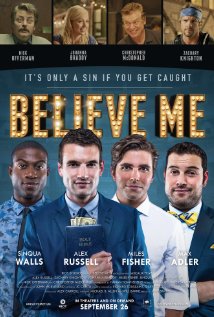
BELIEVE ME
US, 2014, 93 minutes, Colour.
Alex Russell, Zachary Knighton, Johanna Braddy, Miles Fisher, Sinqua Walls, Max Adler, Nick Offerman, Christopher Mc Donald.
Directed by Will Bakke.
Just as the title, Believe Me, was fading from the screen, there was a momentary after-image of just three letters from Believe: LIE. It was an indication of what was to come, a story that was based on deception – until the end, when all the edifying plot developments emerge.
One of the advantages for this reviewer was that he knew nothing of the film, simply asked to review it in advance of release, sent an Internet connection, so it was all unexpected. Soon into the film, it seemed that this was something of a piece of Christian film-making, even though the behaviour of the central characters was less than edifying. And, by the end, the film was communicating a very strong Christian message – interestingly, not a church-based message, but a social awareness, outreach message.
Ultimately, this is a film for a Christian audience though they might be surprised along the way at the four characters and their behaviour. It is always difficult to tell how a non-Christian audience will respond, some thinking that the material is irrelevant, some thinking that this kind of storytelling is beneath them, others, perhaps, giving some thought to the implications of the storyline. While there is a conversion kind of thrust in the narrative, it would be interesting to have some feedback to know whether the film was an occasion for some kind of conversion experience.
After finishing the film, it seemed important to look up the Internet Movie Database to find out something about the director, Will Bakke. In discovering that he had made two documentaries, with Christian themes, one, One Nation under God, about a group of four young people (including himself, his co-writer for Believe Me, Michael B. Allen, and Alex Russell, the main actor) decide to test their faith and beliefs, whether this relationship with faith was just routine. Part of Michael B. Allen’s plot summary for One Nation under God reads:
'Four college Christians look at their faith in Jesus and realize that it's based on routine rather than a genuine relationship. They decide that to fully understand their faith, they need to test it against others' beliefs. Michael B Allen, Will Bakke, Lawson Hopkins, and Austin Meek set out on a journey around the United States beginning in Dallas. They travel west to the Los Angeles, north to Seattle, east to Boston, and finally, South to New Orleans before heading home. Along the way, they meet several different characters including a policeman, a hippie clown, a Scientology ex, a congresswoman, a homeless man, and many more.'
For the next film, the four friends went on a trip to Europe to find themselves, their values, their faith, Beware of Christians. The comments on the films range from admiration to condemnatory and hostile.
With this background, Will Bakke decided to create a fiction along the same lines. This time his friends are college students who are looking towards their future, The central character, Sam (Russell) finds that he needs several thousand dollars to pay for his studies. He encounters some people who raise money for development and missionary work in Africa, surprised at how much they make, and decides that he and his friends should set up a system whereby they preach development, rake in the money and skim off amounts from the top. Not exactly edifying. Eventually, Sam is very good at it, his other friends serving as MC’s, as accountants, as backup.
Amongst the people they encounter is Callie, a sincere young woman who has spent time in Lesotho, Gabriel a musician who performs at the rallies and Ken, an American-style organiser and entrepreneur. They go on the road, do the skimming of the money, but different ones at different times have twinges of conscience about what they are doing.
Eventually, they have to face the reality of themselves, their lack of belief, their are exploiting people, and some repercussions for their futures.
Clearly, this is a very earnest film, but after the earlier documentaries, the team have decided that a way of communicating best to the wider audience is to create a fictional story. Which is what they have done.
1. The title? Issues of faith? The indication of the word, Believe, the emerging of Lie? Faith, fraud, exploitation?
2. The director, his background, religious, his work? The other members of the cast, co-writers?
3. The target audience? Believers, non-believers? Christians? Evangelical Christians?
4. The tone of the plot and treatment, for believers, for sceptics, the possibility of change of attitudes – possibilities for conversion?
5. The framework, Sam and Pierce, the applause, the show and the appeal? Flashbacks?
6. Sam, his life, his studies, partying with his friends, the characters of his friends? The interview with the University authority, losing his scholarship, the need for money?
7. The campaigners, Sam seeing them, their influence on people, the quality of the speakers, the music, the nature of the appeal, the collection of the money, audience response?
8. Sam and the idea, discussions with his friends? Close to Pierce and relying on him? Sinquo and his response, African- American, accounts? Baker, friendship, scepticism, more blunt in his approach?
9. The issues of whether the scheme was moral or not? The discussions, the decision?
10. In action, the spiel, the lies? Ken and his approach, his background, entrepreneur, believing in Sam, employing him, the tour?
11. Gabriel, his music, personality, his place in the group, his compositions, in performance? Ultimate suspicions, with the touch of jealousy?
12. Callie, a woman of faith, her African experience, joining in the appeals, her trust in Sam?
13. Ken, the big buildup, Sam going on stage, the stage fright, hesitation, the others urging him on, coming to, entering into the spirit of the appeal, the enthusiastic responses?
14. The financial situation, the group taking their cut, covering it up? The reaction of each of the group, Sam and his questions, especially from Calie? Pierce and his enthusiasm for the process? Sinquo and his doubts? Baker not concerned?
15. Gabriel, the music, yet the expose?
16. Callile, sympathetic, discovery of the truth?
17. Sinquo, the accounts, his decision to move out?
18. Sam and his being exposed, the discussions with Ken, the consequences, his promise to make good on the fraud? How much of a conversion experience?
19. The film relying on the narrative, the characters and situations – but for a message?
Published in Movie Reviews
Published in
Movie Reviews
Tagged under
Saturday, 18 September 2021 19:58
Everest
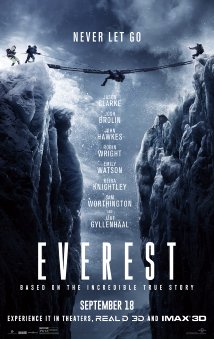
EVEREST
US, 2015, 121 minutes, Colour.
Jason Clarke, Josh Brolin, Emily Watson, Jake Gylenhaal, John Hawkes, Ciaran Knightley, Martin Henderson, Sam Worthington, Elizabeth Debicki, Robin Wright, Michael Kelly, Ingvar Eggert Baltasarsson.
Directed by Baltazar Komakur.
One of the questions this film raises is, of course, why would people want to put themselves in such danger and such physical exertion, demands on mental stability, to climb Mount Everest. The screenplay does mention the obvious ones, because it’s there, and because someone can. But that is not enough to explain the exertions of Edmund Hillary and Sherpa Tenzing in 1953, the success of individuals and groups who have worked their way to the summit, and the guided climbs of the 1990s – of which this true story is one.
Sources for the film include a book by journalist John Krakauer, Into Thin Area, which became a television film in 1997, Into Thin Air: Death on Everest. Krakauer himself did reach the top as he observed those were climbing, those were guiding, those who were the supports both on the mountain and at base camp. Another source is by Beck Weathers, Left for Dead: My Journey Home from Everest. Preparatory filming was done in the Himalayas some years before production and photography in the Alps supplied for snow, ice and avalanche sequences.
Interestingly, the director, Baltazar Kormakur, is a native of Iceland.
Rob Hall, a New Zealander, had a company in the 1990s which arranged for clients to go to the summit. Here, he is played by Jason Clarke, a sympathetic guide, concerned about individuals and groups going up the mountain, in contact with his pregnant wife (Keira Knightley with a Kiwi accent). There are some glimpses of his American counterpart, Scott Fischer, played by Jake Gylenhaal, rather devil-may-care climber, with his support team who shunned the use of oxygen high up.
The audience leaves New Zealand with Hall and with Helen Winton, the person in charge for the base camp, played by Emily Watson, something of a strange experience hearing her also speaking with the New Zealand accent. She is the mother-figure at base camp, sympathetic but also resourceful.
Then the audience arrives in Nepal with the group, travels through the countryside, reaches the Himalayas, goes across gorges on precipitous bridges, arrives at base camp, where they relax, prepare psychologically and physically, with the help of the company doctor, Elizabeth Debicki.
Hall’s group includes a Texan, Beck Weathers, played by Josh Brolin, seemingly full of confidence, but prone to depression which disappears when he is climbing mountains. He keeps in touch with his wife (Robin Wright) and his children back home. Then there is Doug (John Hawkes), a postman who has made several attempts and has promised the children in his home town that he, just an ordinary man, will plant a flag on the summit. There is a Japanese climber, a woman who has succeeded on six challenging peaks, Everest being her seventh. Amongst the support group are Sam Worthington and Martin Henderson.
The film presents the Himalayas in all their beauty, their ruggedness, not underestimating in any way the physical and psychological challenge, the realities of some people dropping out, unable to continue, and some reaching the top, almost exhausted, planting a flag, being photographed, a lifetime achievement no matter what happens afterwards.
Perhaps there are too many characters to deal with within the running time, and the film spreads itself amongst all, But, the focus is on Hall, Fischer, Weathers and Doug, Helen and the support team.
Maybe there are a couple in the audience who would be so moved by watching this vigorous film that they would opt for a trip to Everest – but most of us will appreciate seeing this visualising of the story, its achievement as well is its tragedy, will be quite willing to stay home.
1. The film based on a true story? The background of the history of the claiming of Everest, the different attempts, Edmund Hillary and Tensing in the 1950s, their achievement, the increase of climbers over the decades, greater ease and skills, groups going to Everest, the leaders, by the mid 1990s the crowds, the blizzard in 1996, the deaths and achievements?
2. The issue of motivation of climbing Everest, because it is there, because people can, the importance of an extreme challenge? Self-exploration, ordinary people trying to do something extraordinary, climbing mountains as a means of moving away from depression? The audience watching the portrayal of the climbs, wanting to go – and not wanting to go?
3. The experience of watching the film, how persuasive in presenting the climbing of Everest, in persuading people not to go or warning them of the great difficulties? The difference between exhilaration and the difficulties, the pain and those who had to return without getting to the top?
4. The director, his background from Iceland? The International cast?
5. Filming in Nepal, in the Alps? The beauty of the vistas, the mountains, the cliffs, the snow, the avalanches, the storms? Fine weather, the sun, clouds? The editing, the special effects and their being meshed with realistic photography? The helicopter photography?
6. The New Zealand background of some of the characters, Rob Hall and his company, his good record with taking people to the top, his capacity for endurance and hardship, amicable, concerned? Jan, her pregnancy, leaving her behind, the phone calls throughout the film, especially at the end and her trying to boost his morale? Helen, the organisation, the doctor and her role? His associates, Guy and Harry? The leaving of New Zealand, the arrival in Nepal, the explanations to the group, travelling by bus, going higher, to the base camp, the rope bridges, the different stages, the nature of preparation, physical, psychological? The necessities for the clients, the plan, the role of the Sherpas, the crew, ropes, the stores of oxygen?
7. Scott Fisher, his different approach, American, happy go lucky, a relaxed character, with his crew, their not relying on oxygen, his main European assistant, tough, helping in the rescues, achieving? His own difficulties and gastric problems, his friendship with Rob, the discussions about helping each other, the agreement? His own personal achievement, going up and down the mountain to help? His death? Harry, member of the group, his help, stranded and dying? Rob, in the snow, the fall? Tough, the search, no oxygen?
8. John Krakauer, the journalist, his articles, the invitation to go, his participation, the story, his achievement, snow blind, the descent, his trying to help? His later book?
9. Beck, his climbing mountains, the Texan, suffering from depression, freed from it on the mountains? His marriage to Peach, his children? His attitude, outgoing American, wanting to achieve? The phone calls, the support of his wife? His collapse, difficulties with his eyes, having to stop, freezing, yet not dying, his return, sending in the helicopter, the difficulties of the manoeuvres, the thin air? His being reunited with his family?
10. Doug, the various attempts, his work as a postman, seeing himself as ordinary, the children at the school? His health, the doctor’s concern, going up, his collapse, the need for oxygen, pleading with Rob to go to the top, his finally getting there, the flag, the photo, the difficulties of going down, slow, his collapse, the lack of oxygen, his letting go and fall into his death?
11. The Japanese woman, having conquered six peaks, Everest as the seventh, her contribution to the group – and the pathos of her death?
12. The South African climbers, the leaders, wanting a certain day to get to the top, hostile attitude towards Rob?
13. Communications, Helen, the mother of the group, her work at the base, sense of community? Anxiety at the situations, the phone calls, phoning Peach, phoning Jan, connecting Jan to Rob and her urging him on?
14. Rob, stranded on the mountain, trying to keep attentive, his talking with Jan, and the sad goodbyes?
15. The film as a drama, as a record, the climbers - sources of articles and books? The impact in the 1990s, the influence on the subsequent attempts for people to climb the peak?
16. The final photos of the characters, tribute to them – and the picture of Rob Hall’s daughter, Sarah, born just after his death?
17. The significance of human achievement – and risks?
Published in Movie Reviews
Published in
Movie Reviews
Tagged under
Saturday, 18 September 2021 19:58
It's a Wonderful World
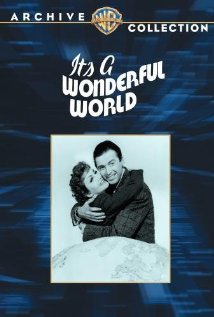
ITS A WONDERFUL WORLD
US, 1939, 86 minutes, Black and white.
Claudette Colbert, James Stewart, Guy Kibee, Nat Pendleton, Frances Drake, Edgar Kennedy, Ernest Truex, Sydney Blackmer.
Directed by W.S.Van Dyke.
Screwball comedies were not a main feature of MGM productions in the 1930s. However, here is an example, with Claudette Colbert starring, in a variation of her performance, Oscar-winning, in It Happened One Night, 1934. James Stewart does his perennial lanky, somewhat bewildered, earnest and committed comic role. There is some amusing support, especially from Nat Pendleton as a not very bright policeman and Guy Kibbee, continually getting knocked out, as a partner in a private eye company.
The film begins with a murder. James Stewart is a private eye, wanting to prove that his client was innocent, but both apprehended, tried in court and sentenced to jail. On the trip to prison, Stewart engineers an escape having found a clue to solve the murder. He becomes entangled with a poetess, finding her a drag, then finding her helpful, then changing his mind, but she, finally, enabling him to solve the case.
The screenplay, by top writers, Ben Hecht and Herman Mankiewicz, stretches credibility, but there are a lot of amusing sequences, culminating in Stewart having to be a Louisiana captain in a stage version of What Price Glory – and a sinister plot involving Frances Drake and Sydney Blackmer revealed.
One of the many films directed by W.S.Van Dyke at this time, including many operettas with Jeanette Mac Donald and Nelson Eddy.
1. The title, from Edwina’s poem? Lying that she had just composed it, quoted on the media?
2. MGM production, locations, the stars, the supporting cast? Musical score?
3. The 30s and the exaggerations of screwball comedies, characters, unlikely situations, resolutions?
4. James Stewart as Guy Johnson, his client, private detective from being a salesman, partnership with the Major? His wayward client? Trying to save him, going to the hotel, the setup in the room, the murder, their both being arrested, in court, sentenced to jail? The need to solve the case? The clue of the half dime?
5. On the train, playing cards, discovering the newspaper advertisement? Handcuffed to Sgt Koretz? The leap from the train, into the river, getting free? The encounter with Edwina? Her fears? The handcuffs, the car, driving, in the woods, the scout and his information, the thick glasses, the disguise and deceiving the police?
6. The police chief, coronets and his associate, their pursuit, finding Johnson and Edwina’s story about the elopement, the photograph, coronets giving $10 to Johnson? The police chief, the photo in the paper, exasperation?
7. Edwina, poet, her quote? Preparing breakfast for Johnson, knowing the truth from the papers? The battle of the sexes? Johnson and his sexism, his down on women? Edwina using her ingenuity, his changing his opinion?
8. Travelling on the boat, going to the town for the play, his jumping overboard, coming to the theatre, finding Edwina there, posing as a journalist?
9. The situation with the play, What Price Glory, the director, her audition for Johnson, giving him the part? The various members of the cast, stage manager? Trying to find the identity of the person who put the message in the paper? Narrowing it down?
10. The audience knowing that the millionaire’s wife was in cahoots with her lover, framing the husband, coming to the town, at the hotel? The lover on the stage?
11. The performance, the shooting, the mistaken identity? The information about the caravan park?
12. The major, Edwina hitting him? Coronets and the police? Edwina and her frantic story, saying that Johnson was guilty, taking everyone to the caravan
park, the confrontation, the solution?
13. Edwina as the heroine, enjoying the action, and Johnson having to change his mind about women? And the hundred thousand dollar fee?
Published in Movie Reviews
Published in
Movie Reviews
Tagged under
Saturday, 18 September 2021 19:58
Macbeth/ 2015
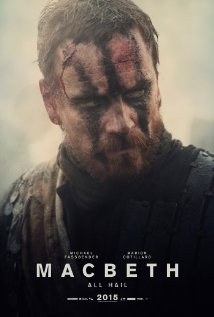
MACBETH
UK, 2015, 113 minutes, Colour.
Michael Fassbender, Marion Cotillard, Sean Harris, David Thewlils, Paddy Considine, Elizabeth Debicki, Jack Raynor, David Hayman.
Directed by Justin Kurtzell.
When there is a theatrical production of Macbeth, the cast and staff usually have a tradition/superstition of not mentioning the play by name. Rather, they call it “the Scottish Play”.
The Scottish aspect of this film version, directed by Australian Justin Kurtzell, is very much to the fore. For a start, most of the actors speak with the Scottish accent, or a Scottish burr, which doesn’t make it necessarily easier to understand for the wider audience – but it does give it that feel of authenticity. There is even more authenticity in the locations where the film was made, the Scottish Highlands, the mountains and crags, the rather desolate looking plains, primitive-looking dwellings and church, a large castle, and some scenes by the sea. It is, to say the least, very atmospheric.
Irish actor, Michael Fassbender, is a physically imposing Macbeth, seen early in the film in full battle mode, wielding his broad sword. But he is a man of intense complications, sometimes pausing before lines, within lines, thinking, reflecting, even brooding. He is certainly influenced by the three witches who are not terrifying hags but rather ordinary looking women, one with a child standing by her, the other holding a baby – who reappear at crucial times, especially in the finale, when their prophecy that Macbeth will be killed by someone who is not human born and Macduff’s premature s birth is explained to him - they stand and then walk away, to do some prophesying elsewhere.
This means that we are constantly re-assessing Macbeth, perceiving his ambitions, the influence of Lady Macbeth (even with sexual impetus and persuasion), the truly bloodthirsty killing and repeated stabbings of Duncan, Macbeth’s hypocritical pretences after the murder, and his mental deterioration, especially at the banquet scene, and seeing Banquo’s ghost. His madness and cruelty assert themselves, especially with the alarming murder of Lady Macduff and her children, tied to the stake to be burnt. With Lady Macbeth’s death, his soliloquy, tomorrow and tomorrow and tomorrow is delivered so quietly, almost with a whisper, and deep interiority.
Audiences may well be surprised at the interpretation of Birnam Wood’s coming to Dunsinane and not in the way that has been traditionally presented but this time in apocalyptic fire. This certainly gives a dramatic turn to the finale, the confrontation and fight with Macduff, the arrival of Malcolm through the flames – and Macbeth still kneeling, dead, on the battlefield.
It is surprising to see French Marion Cotillard as Lady Macbeth, ruthless in a more subtle way, more feminine than is usual (rather than her cry of “unsex me”). She is very much complicit in the murders, devoted to her husband, but having to take control when Macbeth appears more and more berserk at the banquet. Her final soliloquy is very impressive, all in close up, the camera not moving to her hands and her awareness of the blood on them.
Veteran British character actors are in support: Duncan, David Thewliss, Banquo, Paddy Considine, and a very effective Sean Harris as Macduff.
The text has been significantly abridged, the film running under two hours, and there is no Porter’s scene, for instance. Rather, this adaptation focuses on Macbeth, Lady Macbeth, Macduff and the restoration of the damaged kingdom under Malcolm. There are many vistas of the bleak Scottish landscapes, but a great deal of the drama is communicated by intense close-ups, individuals, two people speaking to one another. Mostly it is dark but there are some surprising sequences in the light.
There are complaints when the film is re-made, many critics comment on the value of the original (even when it is decades since they have seen it). With Shakespeare’s plays, audiences do not worry about having seen many versions, learning something different from each, enjoying making comparisons. This version is a significant contribution to the impact of Shakespeare’s tragedies and of the Scottish play.
1. The Scottish play, reputation, the tradition of performance? Onstage? Film versions? Memories of Orson Welles, Roman Polanski?
2. Shakespeare, tragedy, the tragic flaw, the fall of the great man? Macbeth’s greatness, his floor?
3. The variety of versions, interpretations, the use of the text, pruning the text?
4. The film Scottish locations, mountains and plains, harshness? Battlefields, accommodation, church, Cathedral, banquet hall? The atmospheric score?
5. The theme of children, the initial death of the baby, that Lady Macbeth was another, her plea to be unsex to, the other children? Audience and Banquo? Macduff and his children? Lady Macbeth? The brutality of their deaths? Duncan and his sons, the role of Malcolm? Macbeth’s vision of the dagger the young man holding it? The tone for the film?
6. The witches ordinary, with the child, with the baby? Plain appearance? Their prophecy? The continued appearances throughout the drama? The witnesses at the end, prophecy fulfilled, their turning away? The film’s focus on the natural and the supernatural?
7. Scotland, the characters and their accents, the kingdom, the role of the King, the fiends? Issues of power, ambitions, warfare, the visualising battles, in the middle of the fight, the slow motion, the postures? The violence? Murders, on-screen? Executions? The theme of blood?
8. Macbeth, involved in the fighting, winning, the delivery of his lines, often pauses between, within? The effect of the prophecies, experiencing the fulfilment, everybody praising Macbeth? The death of the child, his wife and her influence, after the battle, the sexual motivation? Duncan and hospitality, the decision, the depicting of his death on screen, stabbing, extended, blood? Macbeth’s hypocrisy, covering, killing the attendance, proclaiming loyalty, his being acclaimed?
9. Lady Macbeth, her character, in the morning for the child, after the battles, the sexual encounter, her ambitions, urging her husband? Replacing the dagger with the dead servants, blood on her hands, the achievement Western Mark
10. Malcolm, his presence, the alarm, his writing away, to England, interpreted as disloyalty?
11. “, In the battles, friendship with Macbeth, the scene of his murder, aliens and his running away?
12. The character of Macduff, strong, leading? Lady Macduff and the children, the realisation, attempting to flee, tied to the stake, their being burnt? Macduff and his reaction, vengeance?
13. The emphasis the film put on the banquet, Macbeth and his deterioration, mental condition, seeing Banquo’s ghost, his losing coherence? Lady Macbeth, concern, her control, urging the guests to leave?
14. Lady Macbeth, her famous soliloquy, all done in close-up, issues of blood but no photographing hands? Her death and Macbeth’s reaction?
15. Macbeth soliloquy, tomorrow and tomorrow and tomorrow, low key delivery, but its intensity, revealing Macbeth’s mentality? The prophecy about Birnam Wood, of the men defeating Macbeth was not born of women? Macbeth confident, arrogant, thinking himself invincible? Birnam Wood, the fire, the ashes would coming to the castle, apocalyptic? Confrontation with Macduff, the heavy fighting, Macbeth and his kneeling after death?
16. Malcolm, return, the scene in the cathedral, or do being restored?
17. Contribution to films of Macbeth?
Published in Movie Reviews
Published in
Movie Reviews
Tagged under
Saturday, 18 September 2021 19:58
That Darn Cat
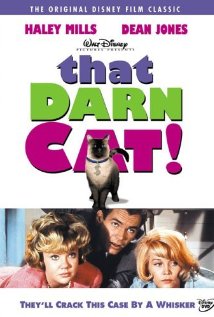
THAT DARN CAT.
US, 1965, 116 minutes, Colour.
Hayley Mills, Dean Jones, Dorothy Provine, Roddy McDowell?, Neville Brand, Elsa Lanchester, William Demarist, Frank Gorshin, Richard Eastham, Grayson Hall, Tom Lowell.
Directed by Robert Stevenson.
In the first half of the 1960s, Hayley Mills appeared in half a dozen Disney features, beginning with Pollyanna and The Parent Trap. This film was the last.
It is an engaging film with Hayley Mills and her pet cat DC, and the solving of an abduction and robbery because Miss Miller from the bank puts her watch around DC’s neck arousing the curiosity of Patti, Hayley Mills.
There are some subsidiary characters including Elsa Lanchester as the snooping busybody neighbour and William Demarest as her hard-hitting husband who can turn off his hearing aids when necessary. Roddy McDowell? is a fussy man, living with his mother, driving Patti’s sister, Ingrid, Dorothy Provine, to work and back.
Neville Brand and Frank Gorshin are the robbers – both serious and comic, Gorshin prone to pratfalls.
When Patti goes to the FBI, Dean Jones is the agent assigned, with a squad following DC, lots of mistakes, but finally solving the case.
The film was directed by Robert Stevenson who made very many Disney films, including Mary Poppins, after beginning his career in England with films like King Solomon’s Mines and Tom Brown’s Schooldays, moving to the US and directing Jane Eyre and a number of thrillers.
The film was remade in 1997, with Christina Ricci as a very unsympathetic Patti, comedian Doug E. Doug as the FBI agent and a whole host of veteran stars in supporting roles, glossy but not as entertaining as the original.
1. The popularity of Disney live action films in the 1960s? Cartoonish in style? The presence of Hayley Mills in so many Disney films? Dean Jones?
2. The city, homes, police, the banks, the streets? Ordinary? The musical score, the Sherman Bros song?
3. DC, the title, audience response to cats? DC wandering, attacking people, the robbers’ apartment, the reactions? Miss Miller as a hostage? The watch on DCs neck? Patti noticing? DC and his seemingly human ways, responding to people’s conversations? His instincts? The tests, his wandering, people following? His causing allergies? Gregory, the issue of the duck, and his getting the gun, his hostility towards DC?
4. Hayley Mills is Patti, going out with Canoe, the drive in, surfing films, always eating? The neighbour and her suspicions? Patti ousting Canoe, his coming to the door, not being let in, following, suspicious, getting stuck in the garage door?
5. Ingrid, the older sister, Gregory driving her to and from work? Attitudes towards DC? Coming home, finding the FBI using her room as headquarters, upset, locked in the cupboard, being rescued by Kelso? Her coming inside, involved, and the attraction towards Kelso? The future with him?
6. Mrs Mc Dougal, tensions with her husband, busybody, looking at the window, always suspicious, voicing her suspicions, continuing to snoop, making judgements? Her husband making the phone call, saying that there was a prowler disguised as a woman…!
7. Kelso, FBI work, Patti seeing him, choosing him, going to his desk, the story, the police chief, listening, far-fetched? Kelso coming, the headquarters and Ingrid? His allergies and sneezing? An eye on DC, following, the comic situation with the variety of police, DC eluding them? Pratfalls?
8. Patti, going to the shop, the discussions with the shopkeeper, phoning and pretending about the watch, the FBI more alert?
9. Patti following Kelso, the picture of the thieves, bickering with each other, their plans, the landlady’s intrusion, the money in the cases? DC disturbing them? Attempting to escape? Being caught, the cash floating around?
10. The ending, Canoe and Patti? Ingrid and Kelso?
11. Comedy, slapstick, the touch of the serious?
Published in Movie Reviews
Published in
Movie Reviews
Tagged under
Saturday, 18 September 2021 19:58
Ocean's 11/ 2001
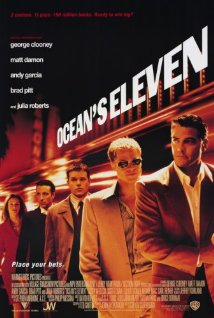
OCEAN'S ELEVEN
US, 2001, 116 minutes, Colour.
George Clooney, Brad Pitt, Matt Damon, Julia Roberts, Andy Garcia, Bernie Mac, Elliot Gould, Carl Reiner, Casey Affleck, Scott Caan, Don Cheadle, Eddie Jemison, Topher Grace, Joshua Jackson.
Directed by Steven Soderbergh.
Nothing to do with the sea. The title refers to thief, Danny Ocean, and his accomplices in an elaborate robbery of three Las Vegas casinos. This is a 'caper' film par excellence. It boasts very strong credits: from Oscar-winning director, Steven Soderbergh (Traffic - and films like Sex, Lies and Videotape and Erin Brockovich) to a star cast led by George Clooney as Ocean. Brad Pitt gives a fine comic performance as Ocean's associate and adviser and there are very good cameos from veterans Elliot Gould and Carl Reiner. Matt Damon plays the slow but finally effective accomplice and Don Cheadle sports a Cockey accent. Their target is ruthless casino manager Andy Garcia who is living with Ocean's estranged wife, played by Julia Roberts.
The first part of the film is the recruiting process and the planning and rehearsals. If this could happen in real life, then it would be an extraordinary feat of engineering, timing and daring - and luck. What the screenplay and the cast do is to let us sit back and watch the finesse with which they mislead the casino staff and get away with everything. There is a lot of wisecracking going on all the time which gives the comedy an entertaining wry edge. Much of this spirit derives from the original film of 1961 which was designed to be a showcase for the members of the 'Rat Pack', Frank Sinatra, Dean Martin, Sammy Davis Jr, Peter Lawford and Joey Bishop (with Angie Dickinson and Henry silver from the original turning up as scarce in this film). Looking again at the original, we see that it is very slight and how much the remake improves on it.
1. An entertaining remake? The status of the original? This one for the 21st century, glamour, developments in technology, and to sequels?
2. A caper film, plausibility and implausibility, the variety of skills, timing, dangers? Giving it because we can!
3. Las Vegas, California, the views, the streets, the city in the casinos, exteriors, interiors, the floor was, offices, the reports? The musical score?
4. Introduction, Danny and his being examined for parole, his answers, his contacts, the card game and his meeting up with Rusty? The big bet?
5. Rusty and Danny and the discussions, the different style, rusty continually eating, the attitudes towards Terry Benedict? Ribbon, past with casinos, Terry Benedict, thinking the scheme impossible, joining in?
6. Rusty and Danny with the plan, rusty making the contacts, Frank, his work in casinos, his placement at the tables? The twins, the cars, rowdiness, their skills? The Chinese and the acrobatics at the circus? Basher, his being taken prisoner, rusty pretending to be the agent and releasing him? Livingstone, his work with computers, has been put down? Saw, in retirement, his age, watching the greyhounds, rusty being persuasive? Linus, his connections, a bit slow, Danny being persuasive?
7. The training, recreating the report, filming it and later substituting the robbery, the variety of tests?
8. Tests, her story, with Danny, his years in prison, the divorce, the being with Terry Benedict, working for the Gallery?
9. Terry Benedict, ruthless, the casinos, his plans for demolition and improvement?
10. The range of personalities in the team? Collaborating?
11. The scenario, the different roles for each? The execution, saw, receiving his box, persuading Terry Benedict to put it in the safe, his watching, feigning illness, his collapse, the group supplying the ambulance and his being taken out? The Chinese, rehearsing his leap, in the box for 30 minutes, open, the door? The twins, with the bulletins, blocking the camera, their carry on, the wheeling the container, as Salz assistance? Frank, Linus acting as the taxman, the confrontation, Terry Benedict present, Linus denouncing Frank, his being dismissed? The racial overtones? Basher, the stealing the of the machine from the University? Causing the blackout? The boxing match, Danny and his hiring the boxer, his being set up, the pretence? His going with Linus, opening the doors, Danny returning and appearing to be bashed? Rusty, swipe man on the phone, persuading Terry Benedict? The encounter with tests?
12. Tests, watching the scene, Terry Benedict’s opting for money, her leaving?
13. Danny, out after breaking his parole, the group joining, and a cheerfully amoral ending?
Published in Movie Reviews
Published in
Movie Reviews
Tagged under
Saturday, 18 September 2021 19:58
Young Tom Edison
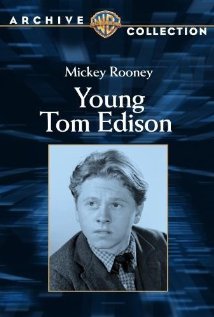
YOUNG TOM EDISON
US, 1940, 86 minutes, Black and white.
Mickey Rooney, Fay Bainter, George Bancroft, Virginia Weidler, Eugene Pallette, Bobby Jordan, Lloyd Corrigan, J.M.Kerrigan.
Directed by Norman Taurog.
Young Tom Edison is a very enjoyable biography of the famous inventor. While the film has a very folksy way of telling its story, commentators have pointed out that many of the episodes, seemingly exaggerated for a film story, are in fact true, including the rescue of the little boy from the train line and the oncoming train.
This is middle America in the 1860s, the small town, George Bancroft as Sam Edison, a worker with a good reputation but rather stern towards towards his children, not affirming Tom and his enterprise. Fay Bainter is Tom’s mother (and she had just won the Best Supporting Actress Oscar for Jezebel). Virginia Weidler is enterprising as Tom’s younger sister.
However, the main interest in the film is seeing Mickey Rooney as the young Tom Edison, at a time when Rooney had been in many supporting roles as a child in a family, but he had become Andy Hardy. He is a touch more subdued in this role, and all the better for the serious approach to the portrait of Edison.
The film shows how he was misunderstood at school, considered addled. He loves doing experiments, is continually curious. After an explosion at school he is refused admission. He also gets up to pranks, using the telegraph to warn surrounding towns that Indians were attacking. However, he is shown as a young man of enterprise, sales on a train, printing news about the war, but actually taking nitro glycerin on the train and causing havoc.
The film shows something of his genius in his using lanterns and mirrors to provide enough nightlight for his mother’s operation and using Morse code for his sister on an oncoming train that a bridge had collapsed.
At the end of the film, Spencer Tracy is seen admiring a picture of Edison – a prelude to the next film with Tracy, Edison the Man.
1. Thomas Edison and his reputation? Memories of him as an inventor, genius? 19th-century figure for the 20th century? Audience knowledge of him?
2. MGM production values, 1940, Mickey Rooney and his status, the cast? The preparation for the sequel with Spencer Tracy?
3. The touches of folksy storytelling? A tribute, accuracy despite the seemingly far-fetched stories? Acknowledging the difficulties in Edison’s childhood, yet his perpetual curiosity?
4. The town, the midwest, the 1860s, homes, the streets, workplaces, stores, school, the railroads? The countryside, the river, the bridge? The technological aspects, the telegraph? The musical score?
5. The Edison family, the strict father, his work, reputation, beating his son, not affirming him? Mother, love, tender, spoiling him, the older brother and his absence? The younger sister, good friends, sharing their experiences?
6. Mickey Rooney as Tom, his age, the experiments in the basement, his curiosity, the hazards, at school, daydreaming, asking questions, the spinster teacher and her severe attitude, calling him addled? The visit to the family and Mrs Edison ousting her? The kids, playing together, bullying Tom and his sister? The explosion at school, the beating, his not being welcome at school? At the station, sending the message on the telegraph about the dangers from Indians? His rescuing the young boy and the father’s gratitude? On the train, selling the candy, the decision to start a business, the range of customers, friendship, Mr Nelson and his role in the train, leniency towards Tom? The printer on board? The military connections, printing the news about the war, Tom’s success? His buying the great range of books?
7. The detail at home, meals, the singing at the piano, his mother’s illness?
8. Taking the nitroglycerin on the train, the military, lowering the explosive into the river?
9. His bad reputation in the town, the storekeeper, his son, the other boys? Giving the boy the powder and his being sick?
10. Tom, deciding to run away, at the train, his mother’s illness, his sister coming to find him, the doctor, the need for an operation, his wariness about the light, the mirror and the lamps, saving Mrs Edison? The shop, returning the mirror, its being smashed, the father coming straight from the train, unaware of what had happened, severe with Tom? The later confrontation, father and son, punching father and son in the store?
11. The episode when the bridge was down, Tom and the idea of Morse Code, people laughing at him, his being allowed on the train, repeating the signal, his sister and brother on the other train, Mr Nelson and his scepticism, the bridge down, stopping the train on time, congratulations and Tom a hero?
12. His leaving his home town, the farewell, into his adult life and achievement – and the glimpse of Spencer Tracy at the end looking at Edison’s portrait?
Published in Movie Reviews
Published in
Movie Reviews
Tagged under
Saturday, 18 September 2021 19:58
Lady Killer
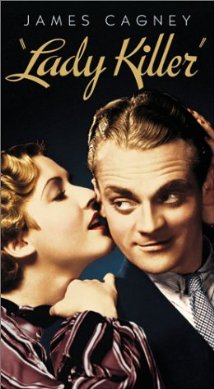
LADY KILLER
US, 1933, 76 minutes, Black and white.
James Cagney, Mae Clarke, Margaret Lindsay, Leslie Fenton, Douglas Dumbrille, Russell Hopton, Raymond Hatton, Henry O' Neill.
Directed by Roy Del Ruth.
Lady Killer is a tongue-in-cheek blend of the gangster film, comedy and glimpse at Hollywood filmmaking. It is a star vehicle for the emerging James Cagney who had already made an impact as a gangster in Public Enemy (and here stars with Mae Clark, the recipient of his group grapefruit in that film but treated far more harshly in this one, dragged by the hair from the room and tossed out, and then literally tossed out of a room in another sequence).
He portrays the smug theatre usher who gets sacked, is picked on by a vamp, Mae Clarke, returning her purse to her hotel room, only to be tricked into a card came and losses. When he realises what has happened, he takes over the gang, and they begin a series of robberies.
When things get too hot, he goes to California, is apprehended by the police, asked to get a job, and catches the attention of film scouts who put him in small parts, then with his own writing his fan letters, he becomes a star.
Needless to say, the gang come to Hollywood, start robbing the homes of the stars, and Cagney is caught trying to return the jewels to Margaret Lindsay, his co-star. He is bailed to become a target, but he is warned by the vamp and there is quite a spectacular chase with Cagney finally vindicated – and continuing his rise to stardom. At one stage, there is a poster and comment on Edward G Robinson as a rising star, already Little Caesar.
1. Entertaining blend of gangster thriller, comedy, look at Hollywood?
2. Warner Bros in the 1930s, the picture of gangster activity, the comic touches with the ultra-smart James Cagney, the satire on Hollywood, the producers wanting stars and tough new faces, the bit parts, filming, especially when stars clashed, fans, magazines, letters? The musical score?
3. Dan’s story, James Cagney at Warner Bros, cheeky personality, gangster roles, song and dance? As an usher, rebellious, chewing gum, making difficulties with the lady and the dog, smart cracks, being fired? Finding Myra’s purse, taking it to the hotel, going in, into the card game, the confrontation, getting his money back, finding the next customer, taking over the racket? Having a club, the clients? The targets, the fake accident, the fake doctor, going into the house, the later robbery? The other members of the gang, Spade and being in charge, Duke and his surly attitude? Myra, the equivalent of the gangster’s moll?
4. The police, the killings, closing in, Dan and Myra going to California, the police apprehending him, his discussions, promising to get a job, wandering around town, the talent scouts, hiring him, the different roles, the Indian, in Lois’s caravan? His writing his own fan mail? The producers wanting new faces, choosing him, his quick rise to fame? His relationship with Lois?
5. The gang arriving, to the hotel, the hold over him, his giving them $10,000, their staying, going on the tour of the stars’ homes, the robberies, the police and their suspicions?
6. Lois, the visit, finding Myra, the clash, the romantic scene and the garlic? Her jewels being robbed, then Dan going to retrieve them, the police catching him with the jewels, in prison? The gang and the bail, Dan;s money, the plan to kill him? Lois and her intention of bailing him?
7. Dan getting out, shrewd, in the car, Myra warning him, his having told the police, the desperate chase, the arrests, his vindication, with Lois, and his future stardom?
8. A variation on the 1930s screwball comedy style?
Published in Movie Reviews
Published in
Movie Reviews
Tagged under
Saturday, 18 September 2021 19:58
Martian, The
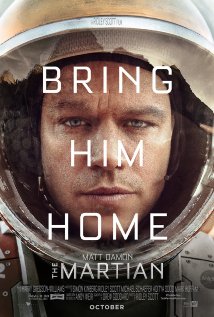
THE MARTIAN
US, 2015, 141 minutes, Colour.
Matt Damon, Jessica Chastain, Kristen Wiig, Jeff Daniels, Michael Pena, Sean Bean, Kate Mara, Sebastian Stan, Aksel Hennie, Chiwitel Ejiofor, Mackenzie Davis, Donald Glover.
Directed by Ridley Scott.
Most audiences will find The Martian very interesting and, with its blend of serious and comic touches, satisfying entertainment.
It is based on a novel by Andy Wier and the screenwriter, Drew Goddard, best known for a number of television series (Lost, Alias, Buffy), offers a very intelligent interpretation of the material, the work of NASA, space exploration, the possibilities for assessment of Mars, space technology, travel, and responding to crises.
Every reviewer has already said it but it is worth noting the impact that Gravity had several years ago and the impact of Interstellar. Interstellar was futuristic and took us into the exploration of what might be and its scientific implications as well as its transcendent cosmological implications. Gravity had a small focus, Sandra Bullock as an astronaut trying to deal with malfunction for survival, inviting the audience to share a dangerous and heroic space experience.
There was some sense of realism in Gravity, but the sense of realism, even naturalism, is the strength of The Martian. It is written and it is all presented as if this could be happening right now and in this way. There was something mythic about Interstellar and Gravity. This is realism that audiences can identify with, certainly the vastness of space and the enormous distances through space, the role of Mars in our consciousness, the skills and work of astronauts and their coping with crises. The dialogue is realistic, lots of (or not quite appropriately phrased) down-to-earth language, including some earthy expletives, and a background of popular songs including Starman by David Bowie, Abba’is Waterloo and, in part of the final credits, very appropriately, Gloria Gaynor’s I Will Survive.
British Ridley Scott has been making films for almost four decades, with one of his earliest films being the space drama with touches of horror, Alien. He has had an interest in the future, Blade Runner as well as returning to science-fiction-fantasy with Prometheus (and the promise of a further Prometheus episode). This time, his material and treatment is much more assured, consistent, audience-friendly as well as audience-challenging.
We all have some idea of what Mars could look like, the red planet. Jordan was chosen as one of the locations for Martian-like scenery. As the film opens, a team is collecting samples when, suddenly, an enormous storm looms up and the decision has to be made to return to earth. Botanist, Mark Watney, is knocked over by debris and thought to be dead. The team, with great reluctance, leaves Mars and returns to Earth. Mark is not dead and is faced with the options of succumbing and dying or to find ways of surviving and even communicating. (Memories of Robinson Crusoe, Cast Away - and even the 1960s Robinson Crusoe on Mars.)
Matt Damon is completely at home in the role, is always popular with audiences, and this serves him very well in getting audience sympathy and understanding as he confides to his in-space-suit camera and to cameras within the centre, how he is dealing with a stranded situation.
Two things to note. The film is highly optimistic in its perspective: that it is possible for the astronaut to survive for a long time, using his intelligence and wits, drawing on skills in improvising; and, secondly, that science is most important for survival. Advocates for the study of science will find this film a huge morale-booster and those who are not skilled in science will find that they have a greater appreciation of the need for scientific knowledge, investigation, and collaboration between nations (and collaboration with Chinese experts in this film is topical for the relationship between the US and China).
The film is quite long and great deal of it is devoted to Mark’s survival, saving machinery, making oxygen, sowing potatoes and using tarpaulins and engines to produce moisture, getting space vehicles going in order to rendezvous with the next Mars mission in several years time.
The film also has many sequences on earth, with the different NASA officials dealing with the situation, how much the public should be told, even whether to tell the homecoming astronauts of Mark’s survival, but all the time using expertise and lateral thinking to make communication with Mark, to find ways of landing supplies, of an ultimate rescue.
Everything does not go according to plan (although Mark is lucky not to have any major health and medical problems during his stay on Mars), there are some crises, differences of opinion between the experts, some individual decisions with touches of rebellion, and the use of common sense, practical expertise and deep knowledge.
On earth, the authorities include Jeff Daniels as the head of NASA, Chiwitel Ejiofor as the supervisor for the missions, Sean Bean as an expert, Kristen Wiig (moving to more serious roles lately although she stands out more in comedies). Jessica Chastain is the commander on the returning spaceship.
Because the film seems so topical, contemporary realistic, it does not come across as futuristic or as science-fiction. But it is most interesting and entertaining on these themes, building its tension and suspense in the final moments of the rescue mission.
1. Science fiction? Science fact? The realism of the treatment? The speculation about exploration in space, Mars, accidents and rescue?
2. The film as topical, NASA, the history of moon exploration, the expeditions to Mars? Space disasters? International cooperation? Mars as a target for investigation and exploration?
3. The adaptation of a novel, the focus on science? The director, his science-fiction, space stories?
4. The title, the overtones of Martian aliens and the War of the Worlds? This Martian not alien? Echoes of Robinson Crusoe, Cast Away stories?
5. The top line cast? Matt Damon, his screen presence, amiable for audiences? Audiences identifying with him?
6. The Mars sequences, filmed in Jordan, the deserts and mountains, barren and hostile? The contrast with Earth, NASA headquarters, other science centres, the media, Times Square…? The musical score and the range of songs from the period, David Bowie, Abba, Gloria Gaynor?
7. The plausibility of the plot, the developments of NASA exploration, the time taken to get to Mars and back, astronauts stranded, possibilities for rescue, the use of ingenuity, applications of science, human endeavour?
8. The opening on Mars, the group, collecting the samples, the particular characters, the commander, Martinez? Getting the information about the storm, boarding, Mark being hit, the commander’s decision, to leave – and NASA deciding not to tell the crew about Mark’s survival for some time, telling them and the effect, the commander and blaming herself, Mark’s reassurances?
9. The head of NASA, the public relations personnel, the various groups of experts, the amounts of information for the public, press conference, ensuring questions?
10. Mark as Robinson Crusoe on Mars, waking, treating his wounds, the issue of oxygen, fixing the oxygen supply, going inside the centre, the amount of food available, fixing the various machines, the plane, to wait for four years, the decision to grow potatoes, his skill as a botanist, the tarpaulin and the water? The potatoes growing?
11. The device of talking to the camera in his space suit, a plausible record of his survival, details of action?
12. The observer of the photographs on Mars, the realisation that there was movement, the range of staff, having to deal with the situation, the discussions, Teddy Sanders and his being in command, intuitions but by the book? Annie Montrose, her caution, attention to PR? Mitch, his expertise, background, disagreements with Teddy? The contact with Bruce, his team and expertise, building? The presence of Vincent Kapoor, his expertise, command?
13. Making contact, the movement of the machines, Mark relying on posters with information, developing his letter code, contact through the computers, dialogue, the messages?
14. The psychological effect for Mark? The rendezvous in four years, his travelling the thousands of kilometres, preparing? The discussions, his not blaming the commander and the crew?
15. His survival, food, fixing the vehicles, the psychological benefit of communication?
16. The storm, the destruction, the vegetables gone, his having to cope?
17. Earth, Barry and the building machines, the contact? Rich Purnell, eccentric manner and appearance, his skills, the maths, ideas, the presentation, the
initial reactions? Following his advice, the risks, venturing out and decisions by the book?
18. The Chinese and their space developments, secret? The experts discussing, the decisions, contact with the US, collaboration?
19. The spaceship, the characters, in themselves, interactions on the expedition, the different roles, the commander, Martinez, the computer calculations, the science? The news about Mark and their reactions? The possibilities to save him? Getting the information about Rich Purnell’s ideas, the discussions,
the boat, the risks, the decision to go back? The human aspects and their contacts with families on earth?
20. The preparation of the rescue, the vehicle, discarding so many parts to lighten it, using a tarpaulin, the details of the rescue, travelling and speed, the plan for the pickup?
21. Mark, the preparation, the vehicle, leaving the base and his appreciation of what had happened, the tarpaulin, ready to go, the tarpaulin flying off?
22. On the spaceship, the difficulties, the speeds, getting ready, the making of the bomb, the blast, the commander going into space, catching Mark, the winding of the tapes, being brought back into the spaceship?
23. Everybody on earth, NASA and the wait? The time? The public, Times Square, international interest?
24. The aftermath, the success of the operation, the effect on everyone?
25. The low-key ending, Mark going to the lecture, with the students – his survival and achievement?
Published in Movie Reviews
Published in
Movie Reviews
Tagged under